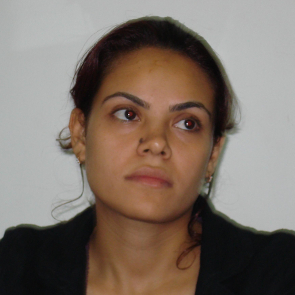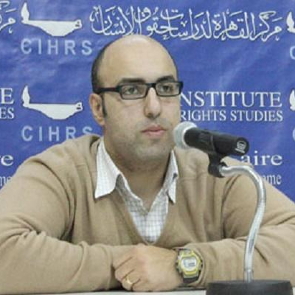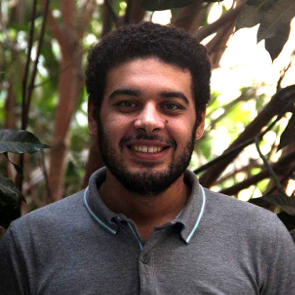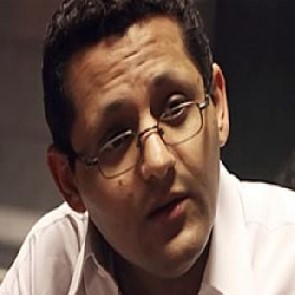Escalating judicial harassment and travel ban against human rights defenders
On 29 May 2016, Egyptian authorities detained human rights defender and journalist Mr Khaled Elbalshy on charges of “disseminating false news and rumours” and “sheltering criminals”. Downtown Cairo Prosecution granted the human rights defender LE10 000 bail, which was paid. He was subsequently released pending trial on 4 June 2016. In a separate case, on 26 May 2016, human rights defender Mr Mohamed Zarea was prevented from travelling to Tunisia based on the order of an investigative judge which the defender believes is related to the foreign funding case against NGOs recently reopened in Egypt.
Khaled Elbalshy is a journalist and board member of Egypt's Journalists' Syndicate and the head of its Freedoms Committee. He is the current chief editor of the independent news website Al Bedaiah, an online newspaper advocating democracy and supporting freedom of speech and expression. Mohamed Zarea is an Egyptian human rights defender and Director for Egypt of the Cairo Institute for Human Rights Studies (CIHRS), a Cairo-based, independent, regional non-governmental organization founded in 1993 working on the promotion and respect of the principles of human rights, democracy and the rule of law through advocacy, policy research and human rights education in Egypt and the Arab region. CIHRS received the French Republic's Human Rights Prize in 2007.
On 29 May 2016, human rights defender Khaled Elbalshy appeared before South Cairo's Downtown Cairo Prosecution following a summons he received several days previously. He was charged on counts of “deliberately disseminating false news and rumors”, in reference to a previous raid at the Journalists' Syndicate office on 1 May 2016, and “sheltering criminals wanted by judicial authorities”, in reference to journalists Amr Badr and Mahmoud El-Sakka, who were present at the Syndicate and are affiliated with it. Both the Journalists' Syndicate Head, Yehia Qalash, and General Secretary, Gamal Abdel-Reheem, were summoned and interrogated in relation to the same case.
The three journalists were subject to interrogation for 14 hours, before being released on bail for the sum of LE10 000 (approximately €1 000). The journalists were informed that their bail fee had been paid, which they themselves refused to pay as they did not recognise the charges being brought against them. Khaled Elbalshy's interrogation lasted three hours. He was questioned about the storming of the Journalists' Syndicate office on 1 May 2016, as well as the reason for Amr Badr and Mahmoud El-Sakka's presence at the premises. The human rights defender explained that it was to ensure their safety and not about escaping the arrest warrant issued against them. The defender and his two colleagues were held at Qasr Al-Nile Police Station for several hours before being released pursuant to an order of the Prosecution. The trial is scheduled to be held on 4 June 2016 before Qasr Al-Nil Criminal Court
In separate cases, on 26 May 2016, human rights defender Mohamed Zarea was informed of a travel ban imposed against him while travelling from Cairo International Airport to Tunisia. Mohamed Zarea was told by security authorities that the order had been issued a day earlier by an investigating judge. The defender believes this is connected to the current foreign funding case against NGOs.
Human rights defender and lawyer at the Arabic Network for Human Rights Information Ms Rawda Ahmed was summoned on 26 May 2016 to report to the office of the investigating judge examining the foreign funding case. Three hours later she was told that the investigation session was postponed until 2 June 2016.
The stigmatisation of NGOs continues in Egypt. In a recent statement, Egypt's parliament speaker Ali Abdel-Aal expressed harsh criticism against “suspicious NGOs” and foreign campaigns organising training courses for Members of Parliament, inciting them to “disrupt the state's constitutional institutions” and “target the country's national security”.
In a recent development and amidst the mass arrest of, and disproportional use of force, against, human rights defenders, journalists, lawyers and activists by Egyptian authorities during the recent peaceful protests, Egyptian courts have proceeded to bring to trial and sentence more than 150 pro-democracy activists to up to five years imprisonment. 47 of these sentences have been subsequently replaced by heavy fines. Human rights defender Mr Mohamed Nagui, who was recently arrested on 14 May 2016 and sentenced to five years' imprisonment with hard labor over charges of “participating in an illegal demonstration”, had his imprisonment sentence overturned and replaced with LE100 000 bail (approximately €10 000).
Front Line Defenders reiterates its deep concern about the Egyptian government's crackdown on human rights defenders and the criminalisation of civil society which has been steadily intensifying over recent years, and calls for an immediate end to the persecution of human rights defenders.
Front Line Defenders urges the authorities in Egypt to:
1. Put an end to the ongoing investigation against Khaled Elbalshy, his colleagues Yehia Qalash and Gamal Abdel-Reheem, and Rawda Ahmed, and immediately lift the travel ban imposed against Mohamed Zarea;
2. Immediately and unconditionally remove the heavy fine imposed on Mohamed Nagui;
3. Immediately cease all forms of harassment and stigmatisation of human rights organisations and human rights defenders in Egypt, as Front Line Defenders believes that their rights are being restricted solely as a result of their legitimate and peaceful work in the defence of human rights;
4. Guarantee in all circumstances that all human rights defenders in Egypt are able to carry out their legitimate human rights activities without fear of reprisals and free of all restrictions.




